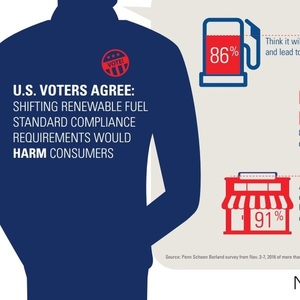Survey: Voters against shifting RFS point of obligation

NATSO
December 16, 2016
BY Erin Krueger
A recent survey has determined the majority of American voters believe that shifting the point of obligation under the renewable fuel standard (RFS) from refiners to wholesalers and fuel retailers would harm the economy and Americans.
The survey was completed by Penn Schoen Berland on behalf of NATSO, the national trade association representing truckstops and travel plazas, along with the Society of Independent Gasoline Marketers of America and the National Association of Convenience Stores. To complete the survey, PSB conducted online interviews with 1,201 likely voters nationwide from Nov. 3-7. The survey has a margin of error of +/-2.83 at the 95 percent confidence level and larger for subgroups.
Approximately 86 percent of voters indicated they believe changing the RFS compliance requirements would increase the price of gasoline and diesel at the pump. In addition, 81 percent of voters expressed concern that shifting compliance costs from refiners to retailers would increase fraud and the cost of overseeing the system. The survey also revealed that 91 percent of voters agree that refiners who make gasoline and diesel would be responsible for compliance.
“These survey findings highlight the underlying truth about the current rules under the RFS,” said Lisa Mullings, president and CEO of NATSO. “A vast majority of U.S. voters agree that any shift would increase fuel prices for consumers, add complexity to the system, and increase fraud.”
Advertisement
Advertisement
“The current policy creates a strong incentive for fuel marketers to blend renewable fuels into the fuel supply while lowering the price at the pump for consumers,” Mullings continued. “Changing the point of obligation would discourage fuel marketers from integrating renewable fuels into the fuel supply while simultaneously raising prices at the pump.”
“No one wants to pay more at the gas pump to help a couple of refiners,” said Ryan McNutt, CEO of SIGMA. “Refiners already charge for the cost of compliance when they sell their products. Let’s not get fooled into letting those refiners collect money and then make everyone else pay for it again.”
“People know it’s not fair for refiners to push their compliance responsibilities onto local businesses and their customers,” added Henry Armour, president and CEO of NACS. “That’s why these survey responses were so overwhelming.”
On Nov. 10, the U.S. EPA proposed to deny several petitions requesting the agency redefine the point of obligation under the renewable fuel standard (RFS). A 60-day public comment period on the decision is set to close Jan. 23.
On June 13, Valero Energy Corp. issued a petition to U.S. EPA Administrator Gina McCarthy asking the agency to redefine obligated party as “the entity that holds title to the gasoline or diesel fuel, immediately prior to the sale from the bulk transfer/terminal system…to a wholesaler, retailer or ultimate consumer.” Refiners and importers are currently considered obligated parties under the RFS. Valero also made a similar request in February.
Advertisement
Advertisement
The American Fuel & Petrochemical Manufacturers also recently filed a petition for rulemaking with the U.S. EPA, asking the agency to move the point of obligation under the renewable fuel standard (RFS) to the owner of hydrocarbons at the rack, which is the same point where fuel excise taxes are collected. That petition was filed on Aug. 4.
Following filing of the petitions, the National Association of Truck Stop Operators issued a statement opposing efforts to move the point of obligation. The group said changing the point of obligation would discourage fuel marketers from integrating renewable fuels into fuel supply and increase prices at the pump. The American Petroleum Institute has also spoken out against moving the point of obligation, instead calling for repeals or significant reform of the RFS.
Related Stories
The U.S. EPA on July 8 hosted virtual public hearing to gather input on the agency’s recently released proposed rule to set 2026 and 2027 RFS RVOs. Members of the biofuel industry were among those to offer testimony during the event.
The USDA’s Risk Management Agency is implementing multiple changes to the Camelina pilot insurance program for the 2026 and succeeding crop years. The changes will expand coverage options and provide greater flexibility for producers.
EcoCeres Inc. has signed a multi-year agreement to supply British Airways with sustainable aviation fuel (SAF). The fuel will be produced from 100% waste-based biomass feedstock, such as used cooking oil (UCO).
President Trump on July 4 signed the “One Big Beautiful Bill Act.” The legislation extends and updates the 45Z credit and revives a tax credit benefiting small biodiesel producers but repeals several other bioenergy-related tax incentives.
CARB on June 27 announced amendments to the state’s LCFS regulations will take effect beginning on July 1. The amended regulations were approved by the agency in November 2024, but implementation was delayed due to regulatory clarity issues.
Upcoming Events










